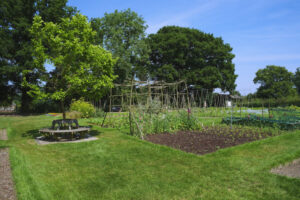Spring is just around the corner! Days are getting longer, the weather is warming up, and soon enough, new growth will begin to appear in your yard. Now is the perfect time to start planning your spring garden. To help you get ready, we’ve put together these tips for planning your spring garden.
1. Look back to last year
Make a mental review of last year’s garden. Were your plants healthy and productive? If not, research ways to deal with problems that might have plagued your garden last year: pests, weather conditions, disease, and insects.
2. Send away for catalogues, or connect online
It may be too cold for your garden, but you can fend off the winter blues during the darkest days of the year by going online to connect with other gardeners, or by sending away for catalogues to read up on this year’s planting possibilities.
3. Try something new this year
Consider trying something new in your garden this year. Perhaps a vegetable you’ve never grown before, or one that might become an acquired taste. You could also grow fresh herbs like basil, thyme, or oregano. These herbs will enhance your meals with flavors store-bought herbs can’t match, and you can preserve them for use all year long. We carry a wide variety of seeds, including herbs, flowers, and vegetables, to help you diversify your garden.
4. Plan for varieties that might take longer to grow
Not all plants grow at the same rate. Biennial and perennial flowers need an early start, while container-grown plants can go into the ground as soon as the soil is thawed. Be sure to research the growing season for each type of vegetable to ensure proper timing for planting.
5. Consider companion planting
Companion planting is a technique gardeners use to improve plant growth and save space. By planting compatible vegetables together, you can boost production. Some good companions include:
- Beans with cucumbers
- Beets with lettuce, cabbage or onions
- Carrots with tomatoes, peas or radishes
- Corn with pumpkins, potatoes or beans.
However, not all vegetables make good companions. Avoid pairing onions with peas, corn with tomatoes, or dill with carrots.
6. Know your nutrients
Each vegetable has its own nutrient requirements for optimal growth. To ensure success, you may need to fertilize your vegetable beds. It’s also important to conduct a pH test on your soil, as vegetables typically thrive in soil with a pH of 6.5. Adjusting the soil’s nutrient levels will help maximize your garden’s potential.
7. Don’t garden alone
Gardening is good way to relax on your own, but it can also be gratifying when you involve others. This year, try to involve your kids, grandkids or other loved ones. And if you grow more vegetables than you can eat, share them with your neighbors, or with your community’s food bank.
Need Help Planning Your Spring Garden?
We hope this year’s planting season is a rewarding one. If you have more questions about planning your spring garden, contact Mendham Garden Center NJ.
For more than 50 years, we’ve been helping central New Jersey gardeners grow their best. Good luck this spring!

